
MW Kaluta, “She’s Leaving Home”
30s Weird Tales is poised between the modern magician waving their wand to conduct the ceremony of material progress in a dismal deluge - like Mickey Mouse in Fantasia and just as fatuous if less melodious - and the notion of humankind as something quasi-mysterious, of ancient lineage, of feminine allure and masculine power.
Perhaps its roster of famous names didn’t know then (or perhaps intuited?) but reading this old stuff it becomes clear that male and female power is no longer what it was. Grace Slick has some cogent comments on 50s icons in her memoire (previously quoted). Speaking of Betty Grable in The Beautiful Blonde from Bashful Bend, she..
..continuously lets fly with sarcastic remarks, takes no guff from children and adults alike, and lets her suitors know she’s charmed by their attention but not available.. She tackles one problem at a time, always with a sense of humour, always self-possessed, always unruffled.. I clearly was influenced by the do-it-yourself heroines I’d watched as a child. (Somebody to Love? Page 6)
I’ve seen the film and know what she means. There is physical romantic comedy and slapstick. There is no ambiguity about the romantic situation, and women will physically repel a man. Women are not shy; they know their allure and will stand up to mean with quick-fire put-downs. There is power on both sides and no ambiguity of meaning or words of doubtful lineage.
Going back to a previous post (Weird 11, 12), where you have ontology (power) you have meaning or epistemology. Figures can then appear in landscapes of sense and sensibility. The female and male psyches are balanced in different ways, the female more intuitive, the male more rational (the heroine of CL Moore’s Jirel of Joiry, for example.)
The power and presence of both aspects of the human psyche is needed to have unambiguous meaning of figures in a typical landscape – a western town, the clothes, the manners. Life is a balance and without it humankind seeps into a bizarre nothingness of Lovecraftian ambiguity. The nothingness is actually fact, and DNA is fact #1. But, as previously noted, the fact that it’s a fact doesn’t make it reality. It just means that we live in a world of facts stripped clean of the wholesome simplicity of the male and female auras, psychic strength, lustiness.
What that could mean is that the competitive struggle cuts us loose from male and female power (ontology). When it comes right down to it, some things are quite subtle and are nothing to do with struggle and all to do with the feeling, the sense, an impending sense of foreboding.. This is what you get from Rimsky-Korsakov’s opera The Golden Cockerel, seen as a very prescient allegory or satire on Tsar Nicholas II (in 1905, well before the Bolsheviks). Rimsky-Korsakov is known as an accomplished folk-orchestrator, and the tumbling refrains have a light tonality which is very pleasant to the ear.
If you take the idea that folk is more intuitive, while orchestration is more rational, you have there two aspects, one more female, one more male. The woman is the natural mystic, and the soul of the land, and the psychic content is in the music. This type of subtle strength is very difficult to define, you have to listen to the orchestration. It garbs your heartbuds and makes you weep or laugh. I would say it’s the idea of reality as a balance between intuition and reason, female and male.
This old sense of indefinable reality is what competitive struggle eclipses. The reason as I said before is it’s a non-sequitur. You are born into the world; there’s no struggle (if you know what I mean!) If you’re not born into the world you may as well be a Martian. Women are the bearers and their intuition is strong and of the earth. The competitive struggle takes you away from the female aura, so you have to distinguish between that and heroic fantasy, which is born of romantic allure.
RIMSKY-KORSAKOV (another lilting epic Scheherazade, Sinbad sets sail - theme for Belit?)
The power and grace of the warrior born is obviously a large part of Howard’s mythos, it goes without saying. I’ve always felt there was a feminine side to him, though, and did put that in CH. Female intuition is the observing of nature without any of the forensic, phallus-like probing. The gentle buds and ripeness of Gaia’s swelling bounty. Fertility, and the basic fact the female needs to be fertilized to swell and grow.
The female aspect is alluring, graceful, intuitive. It’s noticeable Clair Noto placed Red Sonja in an enchanted forest for her blood-raddled run (see Aspects, Weird 15), especially the “Red Lace” sequence, which you could see as Red Venus penetrating the underworld, has the sense of the power of a cycle of life-death. Red Sonja is the pure spirit who is symbolic of fertility in a bloody and sinister kingdom.
I’m a fan of Noto as I think she shows a similar intuition to Howard’s own. Intuition is just the ability to see things without probing too accurately. However, as noted, the danger of accuracy is that you enter a transformative maze where the human physique is listless and barren.
This goes back to the point that facts are less real when they transform the world into a maze-like struggle instead of one of athletic grace (Weird 11). It’s also the idea of a closed-system like the global financial order that sometimes reads like diktats from Mars. In some sense they are from Mars, deep in some underground canals and far from the lustiness and ripeness of Mother Earth.
In a certain sense the forensically factual, accurate corporate world is masculine and predatory and therefore less real. Female intuition sees what is there and not what “facts” tell them is there. The allure and dark mystique of Brundage’s Weird Tales covers. The Oracles at Delphi tripping with gay abandon down catacombs of noxious vapours.
Artemis, Daphne, Venus, Proserpine. The female mystique symbolic of rebirth; of the wild places of abandon where instinct runs free; of the hunt and the chase; of blood spouting from ruptured spleen shot from chaste Diana’s bow; of the rich and cool loam watered by springs of tinkling grotto. Life-death. Eros is born not out of facts but out of blood and soil. There is a dark allure to this mystique, something like the primitive power of Rasputin over Nicholas II And the Tsarina.

True love, home
Those who are of the Earth have primitive intuitive knowledge, and I think it applies to all mystiques, whether it’s the Garden of Eden, the Oracles at Delphi or Brundage’s Weird Tales covers.
The warrior has to know death and gain a psychic strength, the berserker abandon of Howard. This is anathema to the corporate mind but a choice has to be made; are we products or are we men? Products are limited to a lifetime and true love dies. Man is born of woman and of the mystique of continual rebirth. We are either of the Earth (Eros) or of Mars.
The warrior reborn shall chop-down the corporate head with thews of iron. We can choose to be strong, we can choose to have myths. What are myths? They are psyche, the dream of the universe. We are fortunate beings and are born of fortune. Now, you could say this is pure intuition and you’d be right; that’s a truism since the world of facts is like a death-force that imprisons with precision.
The clever maze of accuracy and precision basically makes everything boring. And why? Because we are no longer on Earth; the clever maze takes us to Mars where no buds grow. Listen to Ivanka Trump, speaking to her fellow-creature in Japan.

(“Squa Tront”, see And God Created)
“All too often, our workplace culture fails to treat women with appropriate respect,” she said. “This takes many forms including harassment which can never be tolerated.”
“All too often” has been identified as a Martian call-signal, from the Martian creature-greeting “altafan”. It’s a sort of in-joke that Ivanka is making to her fellow-creature Shinzo; Martians use “all too often” (altafan) as a way of generating boredom because - make no mistake – they designed and built the maze. Altafan is a creed that says everything is capable of explanation.
Maybe, if we renounce the heritage of Eros, of Man the mystique and Man the athletic warrior, of filthy Oracles in trippy moonlit veils, of Venus in the midnight shadow. Yes, it is possible to explicate a corporate reality that we are the products of, for as long as we live, if living it is since products have built-in obsolescence. That world of weakness is for the truly lost. We have strength in our hearts and sinew in our flesh. We seek to retake the psychic kingdom of icons that are fortunate beings, that fall from the sky, that are not made but grow anew.
Icons of the human figure within the mystic aura of time-lost surroundings. The world of female intuition and not of facts. The world, in short, of Brundage’s Weird Tales covers, true icons of western civilization since they expose what the corporate maze of pseudo-rationalism covers-up; the collective unconscious of the daemon in human form (see CH 13). Necromancers who lust for the world and its treasures, who use politicians as pawns, and who only the pure warrior of noble creed and sinew of iron has the intuitive force of will to oppose in arms.
While Howard is wild muscle, Brundage is the romantic allure of feminine drapery in vistas of heroic decadence. All this acts as a powerful counterpoise of age-old mystique to the insane necromantic urges of despoilers of air and earth. Brundage’s covers wrap the heroic fantasy in the bondage of human lusts (And God Created). The age-old erotic decadence pulls you into that world that exists in our dreams, our psyche, our myths. In that world, the necromancer can flail and plunder but he cannot dominate as the female forces of fertility add lustre and decadence.
The moonlit shadows of a Brundage cover are erotic filth of a very high order, graceful, sinuous. The carefully draped female figures, like Red Venus, penetrate the artful decadence of a dim, dank underworld. The lustre of Eros (or Proserpine) and Pluto is irresistible. The alluring vistas have a classical grasp of graceful abandon that has a dark and mysterious side; the mystique of rebirth, renewal.
There’s a certain simplicity – ingénue – to the eternal grace of women in decadent conditions. The gypsy motif. The virgin Mary. There is no explanation possible here; there is simply a state of purity in decadence. This state can never be achieved in a corporate world; it’s very difficult to have grace, purity or decadence let alone all three! Brundage’s covers of figures in a state of purity in undress are a significant milestone in western civilization, one that eclipses the later 20th century (pseudo-scientific) innovations, excepting USSR propaganda posters and folk-art, natch.
Their simplicity is iconic and tells you more about the human condition than any number of Jackson Pollocks. You might expect modern art to reflect the shallowness of a pleasure syndrome that masks Medusa-like writhings of mass-psychosis – an image from Shambleau, CL Moore’s classic Weird Tales tale. Yes, because reason in a corporate system is applied to pleasure, whereas the psyche, the deep underbelly of mankind, is not rational.
In order to avoid the horrors foreshadowed in Shambleau there has to be an alternate to the male pleasure principle – the sham face of a corporate world – and that would be a female aura, the purity of natural forces. This alternate future would have to deviate from corporate-Darwinism and its practices which are agents of blandification and psychic damage.
The female aura is the bearer of life and the athleticism and psychological grace that stem from that birth. Positives become negative; a natural aura. In that alternate future, the plunging eagle and the Puritan ingénue (Indian Summer, Alternates 7) take the place of Darwinian phallus-mongers.

(Daily Record)
Iconic strength born of an egg (tap, tap, tap). The fierce reality of an eagle is hatched from dreaminess and serenity. This is the female aura. There is no struggle as an end in itself; it’s an attitude born of phallocentric reasoning. The aerie has gaiety; it may not seem that way but Dionysus is born of gaiety and the buds of May, the bowers, the harvest fruits below.
A hatchling is not struggling; it’s a complete non-sequitur. It’s hatched from an egg; it comes into the world as an iconic raptor in its mother’s aerie which feeds its young in complete serenity and motherlove. Matriarchy and patriarchy.
life death

AERIE
We, and the birds above us, are not here to survive, we are here to be born, to spread wings and cleanse the soul. We who are born of woman will inhabit a feminine aura. It’s the difference between the Kremlin and the Winter Palace of the Tsarina (see homely picture above). We are not dependent on survival, contrary to orthodoxy; we are dependent on birth. The non–sequitur is total, so the turnaround is total. The feminine mystique comes centre-stage, as from time immemorial. This is what has been lost to orthodoxy; this is what we are taking back from corporate-man.
What “they” call the alpha male is not the acrobatic warrior of western civilization and pre-civilization. Our heroes are Leonidas of Thermopylae and the 300 Spartans. The Athenian hoplite who turned the sea red at Salamis. Our heroes are also the majesty of the great golden eagles who sweep in death-arcs on the fields. The fibrous patterns of leaves that fall on the same fields. Not survival but actually iconic form that lives and dies and is the stuff of legend. Our heroines are the Tsarina who loved unwisely yet deserves vengeance. Calamity Jane and milkmaids of yore, friend to horse and cow, romantic allure and bare-faced cheek.
I did mention Laurie Lee’s Cider With Rosie at one point; the allure of ruddy-faced children and the abandon of straw and cow pats galore. The allure of the west, or the Cotswolds, is not a factual thing, or even a survival thing. It’s age-old motifs that litter the landscape in careless abandon with the romance of free living in attendance. No tyranny of thought, no tyranny of concrete; no tyranny of men. No tyranny, only the presence of women of supple means who dot the landscape in frocks of coarse fabric.
Home







